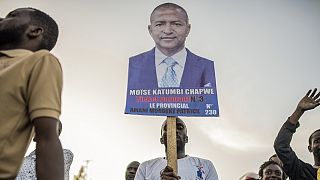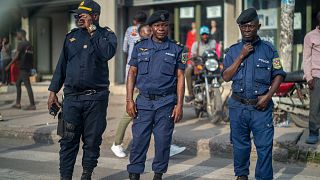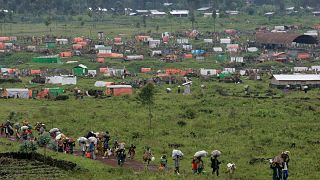Democratic Republic Of Congo
Gedeon, 22, driving his auto-rickshaw through the bustling streets of DR Congo's capital Kinshasa, said he never imagined he would end up doing the job he does.
Like many young people in the deeply impoverished central African nation, he said he had high hopes that the government can deliver a better future.
"I want to go back to school," said Gedeon, who has worked as a rickshaw driver for five years.
He wants to become an electrical engineer, he explained, but poverty stopped him from attending university.
Voters are due to go to the polls on December 20 in the Democratic Republic of Congo. President Felix Tshisekedi, 60, is running for re-election.
Young people -- many of whom suffer from chronic underemployment -- make up an important voting bloc. Over 60 percent of the country of 100 million people are under 20 years old.
AFP interviewed several young Congolese people ahead of the vote, with most asking for a return to peace in the conflict-torn country -- and jobs.
Raphael Rubangiza, 18, linked the upcoming vote to hopes for a better job market.
He said that voting "competent people" into office would mean "we'll have opportunities, we'll have jobs".
But Rubangiza, who studies civil engineering in Kinshasa, is under few illusions. Many graduates "end up selling phone credits," he said.
The DRC is one of the poorest countries in the world, despite its vast mineral wealth. About two thirds of the population survives on under $2.15 per day, according to the World Bank.
The major candidates for the presidential election have all pledged to deliver more jobs. Tshisekedi has promised to create 6.4 million new jobs if he wins a second term.
Promises
Precise figures are hard to come by, but unemployment is believed to be rampant. Valery Madianga, a researcher at a Kinshasa-based think tank, estimated the youth unemployment rate at about 70 percent.
Many thousands of people graduate every year only to enter a job market with vanishingly few opportunities, either in the private or public sector.
Prisca Musangi, 27, studied law in Kinshasa but cannot find work.
"We, young graduates, want to join and have careers in public institutions without having to be recommended," she said, referring to the nepotism that often rules who is hired.
Alfred Bopando, a 29-year-old head of a finance and communications company, likewise said he wanted the next president to "give work to young people".
He is fed up with empty pledges: "We can no longer tolerate promises," Bopando said.
Floribert Anzuluni, one of the youngest of the presidential candidates running in the election, who wants to tackle youth unemployment, agreed.
"This situation cannot be resolved through promises," the 40-year-old said. "To create jobs, you need to create companies."
'Always wars'
Ending conflict in the DRC is also top of the agenda for many young voters.
Beni Mingi, 25, a postal worker in Kwilu in the west of the country, said he wants radical change.
"Those who were given power have done nothing," he said. "In terms of security, there are always wars."
Armed groups plague much of eastern Congo, a legacy of regional wars that flared during the 1990s and 2000s. One such group, the M23, has captured swathes of territory in the region since launching an offensive in late 2021.
In the eastern city of Goma -- which is almost surrounded by the M23 -- law student Brave Kafumbiri said that restoring stability was a priority.
Future leaders must "put an end to the M23, either militarily or diplomatically," the 25-year-old said.
"We finish our studies, we don't have work, there's insecurity in the whole of the east of the country, the population lives on less than $2 a day," he said, summing up the problems.











00:56
Peace talks between DRC and M23 rebels 'moving in the right direction'
00:59
DR Congo's new opposition coalition launched in Kinshasa
Go to video
Togo suspends French state-owned broadcasters RFI and France 24
01:41
DRC: UN rights chief says army, M23 forces have committed atrocities
Go to video
Protesters gather in Ivory Coast, demand Thiam's return on electoral list
02:13
Cameroon: Police, opposition supporters clash as election looms